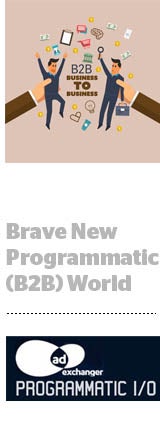 To borrow a phrase from baseball, B2B programmatic advertising is still in the early innings.
To borrow a phrase from baseball, B2B programmatic advertising is still in the early innings.
A couple of factors have kept B2B marketers from fully adopting the media strategy as rapidly as their B2C brethren.
“The biggest difference in B2B and B2C programmatic is the value of the inventory,” said Tony Uphoff, CEO of Business.com.
“In many cases, you’re talking about the few who buy for the many, as opposed to many who buy for few. If you’re a traditional business marketer, you’re trying to tap into volume markets.”
In high-quality B2B environments, that means tapping into a combination of “firmographics” – things like the dynamics and health of a company, number of employees and revenue – as well as the demographics of the influencer or purchaser within an organization who may engage with an ad.
In addition, lead times are typically much longer in B2B marketing because sales cycles are less linear.
“In B2B, you’re trying to build this relationship, which you nurture through, from a white paper to an offline event to an offer, whereas the web has been more closely tied to B2C,” said Penry Price, VP of marketing solutions at LinkedIn, speaking at a roundtable hosted by Oracle at Advertising Week.
There are more challenges than upsides in B2B programmatic at the moment, said Dina Gowar, who works on global media innovation and technology for Dell.
Streamlining The B2B Funnel
It’s hard to equate an online lead to the tangible value it creates along the customer journey. It’s one thing to generate leads and drop them into one’s sales force automation system, but that’s the stuff of short-term strategy.
“As a business, we want to look across an entire portfolio and evaluate the whole customer journey from offline to online,” Gowar said. “It’s really hard to crack commercial attribution in B2B.”
For instance, cookies – often used by B2C marketers – weren’t as useful to B2B marketers to connect demand gen back to branding initiatives.
“Most of the traffic to B2B websites was not cookied, nor did it enable the type of information you [a marketer] need to target [an audience] effectively,” noted Chris Golec, CEO of Demandbase. Such information might include industry vertical, the size of a business or who are their customers or competitors are.
This factor isn’t accidental, according to Business.com’s Uphoff.
Because B2B publishers’ bread and butter came from offline trade events and print publications, they didn’t consistently invest in the tech for audience monetization.
Digital B2B publishers typically fell into two camps: they’d excel at the top of the funnel and provide display ad opportunities but were more detached from performance and lead gen. Or they’d serve as a platform for lead gen, but wouldn’t be considered a branding destination.
That’s resulted in some disconnect between the B2B publishers’ media assets.
“What is evolving is publishers’ ability to bring different forms of advertising together,” Uphoff added. For Business.com, about 35–40% of its display ad inventory will be sold programmatically this month. It is not, however, prioritizing display over custom or native content.
“We’ve engineered display ads to work with content marketing assets, which we’ve incorporated into the cost per lead for the advertiser,” Uphoff explained.
As soon as a site visitor downloads a white paper or consumes some content marketing, Business.com would retarget through display or other channels.
From a data standpoint, uniting some of these once disparate executions could result in more insights for marketers.
Ultimately, there needs to be enough connective tissue between demand gen and brand engagement for a marketer to convert a prospect to a lead to a customer.
In addition to more B2B publishers’ embracing programmatic, Dell’s Gowar said B2B advertisers still struggle with access to robust, up-to-date B2B data.
“I’d love to see some really strong data partners or data points come to light,” she said. “I work in a global capacity at Dell, and if you go outside of the US, not only do you have challenges with robustness of data, you have even less scale, different laws, lack of maturation in market and a lack of technical evolution. It’s even more complex outside of our own borders.”













